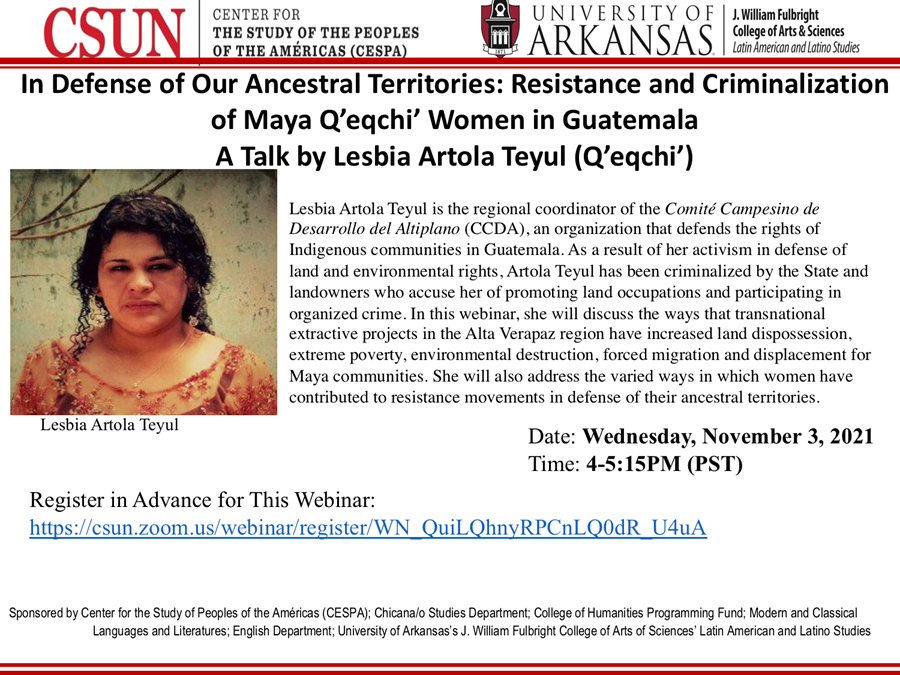Please join the Latin American and Latino Studies Program (LALS) for a virtual talk with Lesbia Artola Teyul, "In Defense of Our Ancestral Territories: Resistance and Criminalization of Maya Q'eqchi' Women in Guatemala," at 6 p.m. CST/ 4 p.m. PST Wednesday, Nov. 3.
Artola Teyul, a Maya Q'eqchi' activist who has been organizing since she was 14 years old, will discuss how transnational extractive projects, including hydroelectric plants, African palm monocultures and logging, have increased land dispossession, extreme poverty, environmental destruction, and forced migration and displacement for Maya Q'eqchí, Poqomchí, and Achí communities in the Alta Verapaz region of Guatemala.
She will also discuss Indigenous women's contributions to resistance movements and how their efforts have been met with political persecution, criminalization, violence, and assassination attempts. To attend, please register in advance online.
The former coordinator of ASOMBRACHOCH, a Maya Q'eqchi' women's organization, Artola Teyul has served as the regional coordinator of the Comité Campesino de Desarrollo del Altiplano/ Community Council of the Highlands (CCDA) for the past 13 years. CCDA works with over 321 Indigenous communities that fight against wealthy landowners and transnational corporations that continue to seize Indigenous lands, contribute to environmental destruction, divert rivers, and ultimately, destroy the livelihoods of Maya peoples and the working poor. As a result of her work with Maya communities, Artola Teyul has been criminalized by the Guatemalan government and by landowners who accuse her of promoting land occupations and participating in organized crime.
This webinar is presented by the Latin American and Latino Studies Program in partnership with the Center for the Study of the Peoples of the Américas (CESPA) at California State University, Northridge. It is part of a series of webinars featuring influential figures and activists from Guatemala that will take place throughout the academic year.
For concerns about accessibility or accommodations, please contact Alicia Estrada at alicia.estrada@csun.edu. For questions regarding the webinar series and/or the Latin American and Latino Studies Program, please contact Yajaira M. Padilla at ympadill@uark.edu.
About the Latin American and Latino Studies Program: The Latin American and Latino Studies Program (LALS) is an interdisciplinary area and ethnic studies program housed within the Fulbright College of Arts and Sciences at the University of Arkansas. The LALS program provides in-depth exposure to the key geographic regions, historical trajectories, social modes, languages, and political, economic, and cultural systems of Latin America and the Latino U.S. The program offers co-major and minor course tracks. For more information, please visit fulbright.uark.edu/area-studies/latin-american-and-latino-studies.
About the Center for the Study of the Peoples of the Américas: The Center for the Study of the Peoples of the Américas (CESPA) at California State University, Northridge promotes interest in and knowledge of peoples descendent of Latin American communities, whether of Latino/a, Asian, European, African, or Indigenous origins, within the U.S. and south of the border. CESPA is committed to a deeper understanding of the creation and movements across borders, and the development of border cultures, identities, and economies.
Topics
Contacts
Yajaira Padilla, associate professor
Department of English
785-766-7869, ympadill@uark.edu
